Last Updated: 1 day ago
If you’re asking, “Why does my cat sleep on my chest?” Chances are, your cat has literally smothered you with love at some point.
We all love a little snuggle time with our feline friends, but it can become a suffocating experience if they decide to sleep on your head or body.
How do you stop your cat from sleeping on you? We’ll answer that a little later.
But first, let’s turn our attention to why your cat sleeps on your chest.
10 Reasons Why Cat Sleeps on Your Chest
1. You’re Hot Stuff
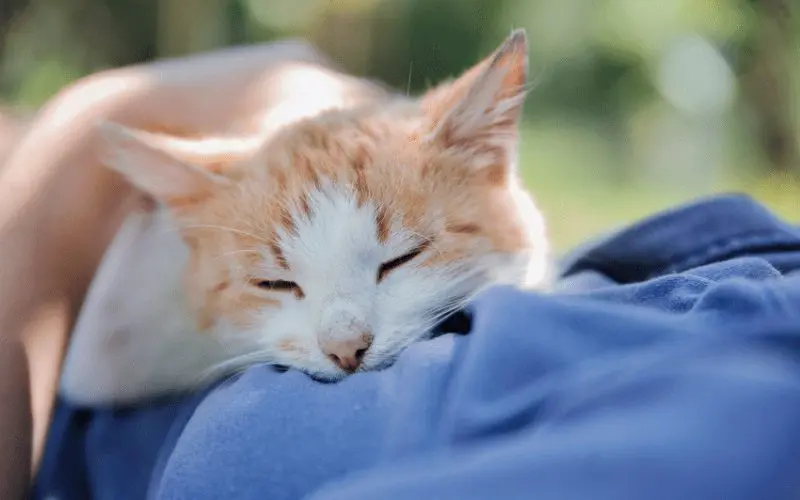
Just as you might snuggle up next to someone on a cold night for extra warmth, your cat does the same thing.
Your cat’s normal body temperature is around 102°C, slightly warmer than the 98.6°F human average.
She has to work a little harder to keep her temperature up, so sleeping near a source of extra heat is ideal.
In this way, your cat can conserve energy, which she will later use to run around the house like crazy, chase toys, and climb cat trees.
Some cats may love to nap in warm places, such as a nice sunny window, while others may decide your body heat makes your chest the perfect spot.
2. Your Cat Owns You
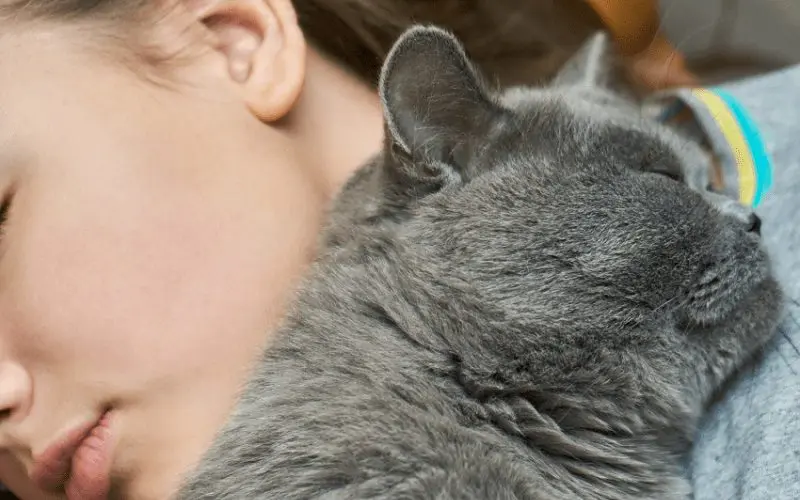
Dr. Susan C. Nelson, a clinical professor at Kansas State’s Veterinary Health Center, told PetMD, “Cats are territorial by nature.”
Your cat shows ownership of her territory by marking it with her scent. One of the ways she does this is by rubbing her face against things.
By lying on you, your cat is able to cover you with her scent and tell other animals that you belong to her.
Let’s not forget that she’s also physically claiming you by sleeping on your chest. As such, no other felines in the house will dare steal your attention and love!
3. Kitty Feels Safe With You
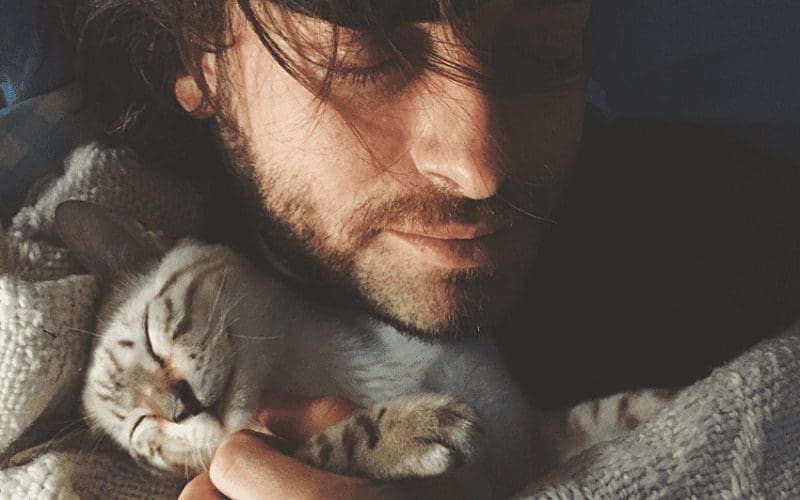
Sleep is a vulnerable time for every creature. While you and I know we’re relatively safe sleeping in our homes, cats don’t quite see it like that.
If your cat trusts you, she will feel reassured being near you. That could make you her favorite sleeping spot.
After all, it’s always easier to fall asleep when you feel relaxed.
Something we’ll touch on again shortly.
4. It’s a Bonding Thing
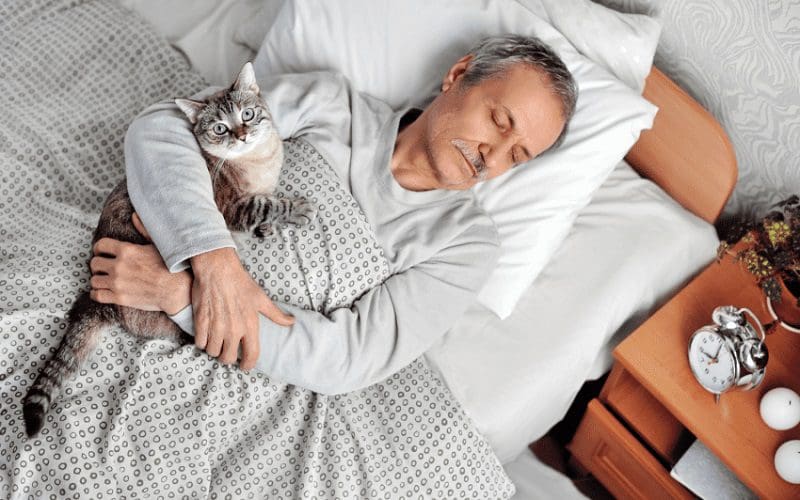
Cat behavior consultant Dr. Mikel Delgado told Catster that cats sleep together “both for warmth and comfort and because it’s a social behavior.”
Dr. Delgado referred to the act of one cat sleeping on the other as “pillowing” and suggested that our cats do this to us too.
It’s one thing to have your cat sleep on your pillow, but using you as the pillow is taking things to a whole other level.
5. Your Heart Comforts Her
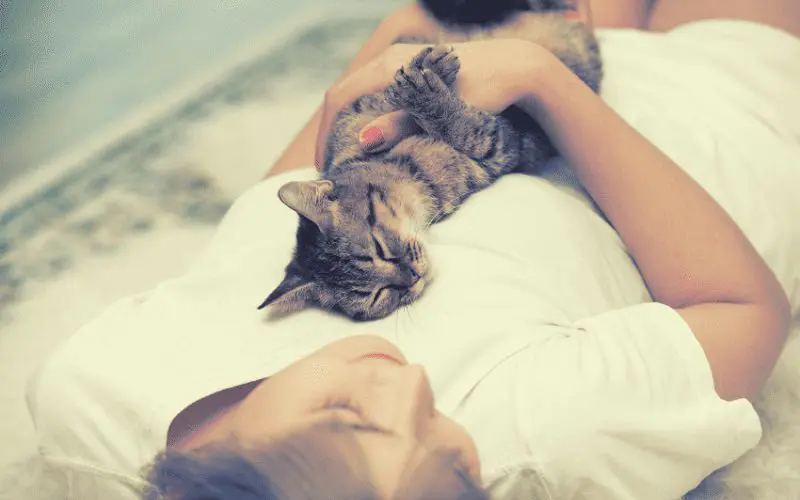
With her finely tuned hearing, your cat can hear sounds that you can’t.
That said, even without feline senses, you can hear another person’s heart by placing your ear on their chest.
A cat’s heartbeat is said to soothe her kittens, to the point that there are toys available to help calm kittens in their new homes.
As your cat’s parent, your heartbeat and breathing have the same relaxing, comforting effect on her.
6. You Are Comfortable
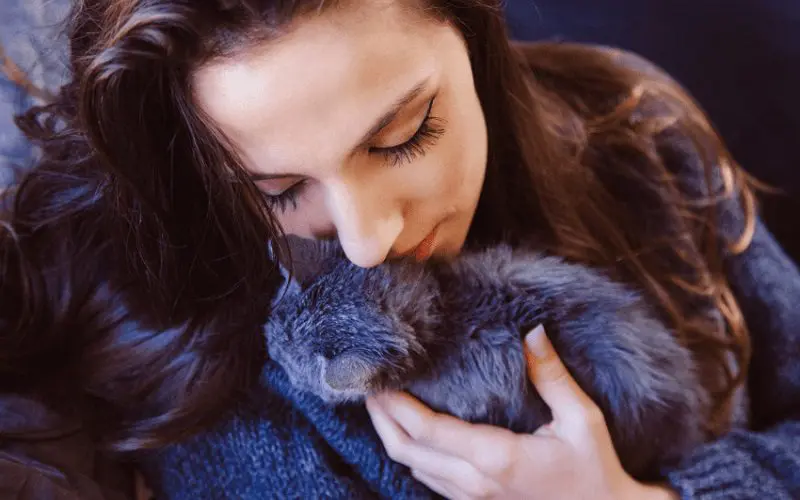
Cats sleep an average of 15 hours a day, with some enjoying up to 20 hours of sleep!
Spending that much time asleep, your cat needs to find a comfortable sleeping position and several cozy places to nap.
That could vary from sleeping on her side in a box to curling up to sleep on your chest every night.
For all the reasons listed above, your cat likes to sleep on you because you are the most comfortable thing in her world.
7. Your Cat Loves You
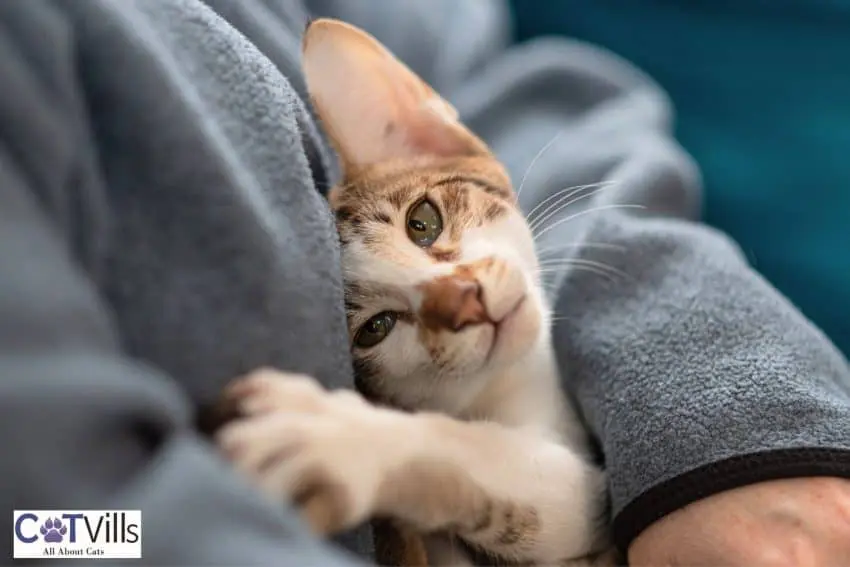
As I already said, cats seek the most secure area to sleep—a spot where they can let their guard down and not worry about predators sneaking upon them.
So, if your cat sleeps on your chest and purrs, your kitty is showing how much they love you and how safe you make them feel.
Think about it. Your cat is very vulnerable when they decide to nap on your chest because they can’t react as quickly as usual if something surprises them.
And your kitty trusts you so much that she falls into a deep sleep without worrying about you turning around in your sleep and squishing them.
8. Your Cat Loves Your Scent
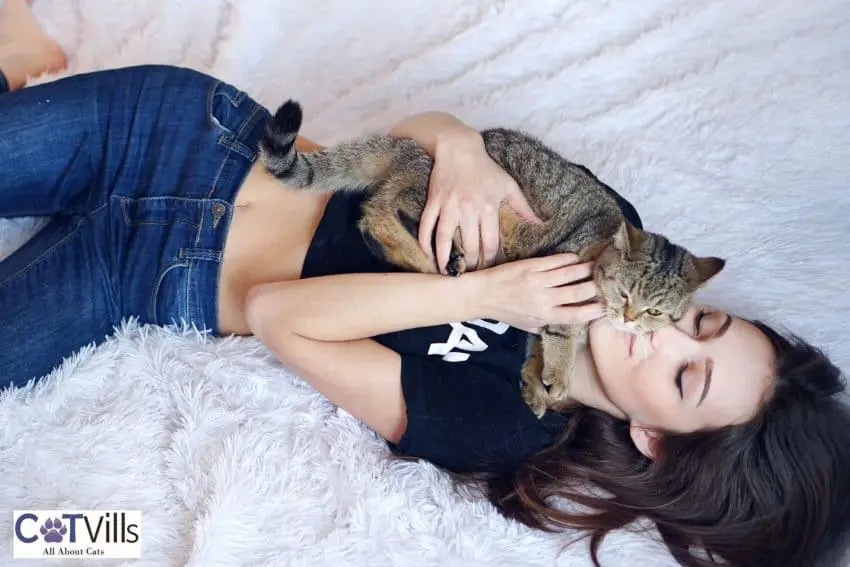
You probably know that cats love certain smells, such as catnip, silver vine, salmon, etc. But do you know that your kitty can like your body scent as well?
Since you take care of your cat’s every need and spoil it rotten, it makes sense that your feline will associate your scent with pleasant things.
As such, when your cat sleeps on your chest, your kitty gets a big whiff of that familiar scent, and it helps her fall asleep quickly, knowing that she is safe and loved.
Moreover, cats often seek familiar scents when they’re stressed or anxious. The mere scent of something so familiar is enough to calm your cat and make her feel at ease.
So, don’t be surprised that some cats dash to your side to hide when in distress.
9. Your Cat Wants to Protect You
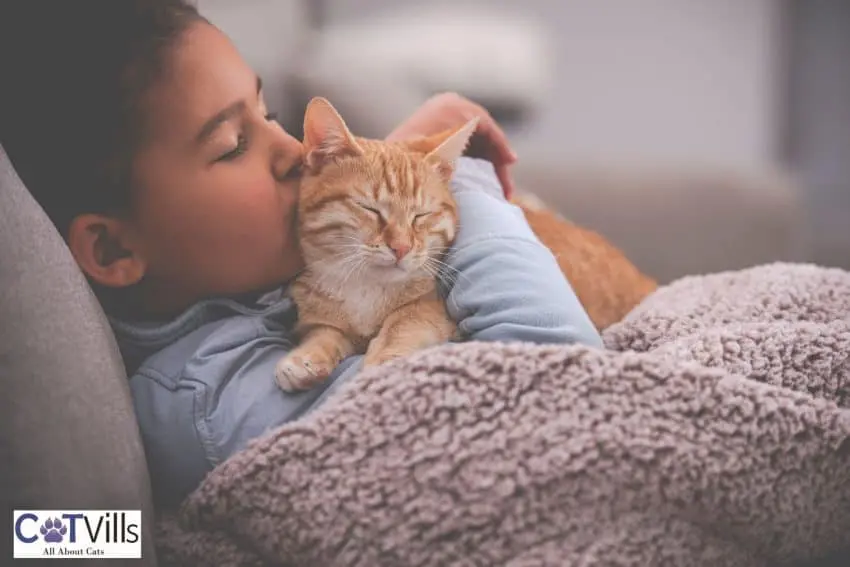
Some cat owners swear their felines sleep on their chests to keep them safe from things that bump into the night.
However, it’s unlikely that cats think about “protecting” their owner in the same way dogs do since they can’t do much against a bigger opponent.
But your cat can still stick close to you during the night to wake you up if there’s a problem or an emergency, such as an empty food bowl.
Moreover, some cat breeds are very possessive of their owners and don’t like it when they have to share.
So, when your cat is sleeping on your chest, she is also “protecting” you from other pets that your cat considers rivals for your attention.
10. Your Cat Knows You’re Stressed
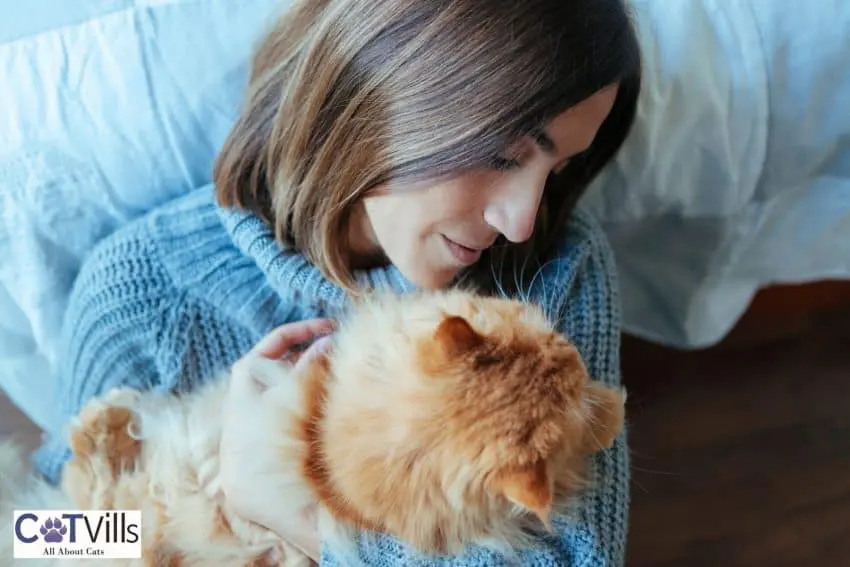
Do you know cats can smell it when you’re stressed or ill? That’s because cats have an excellent sense of smell and can detect even the slightest chemical changes in your hormones.
Some people even say cats have such excellent intuition that they lay on whichever part of the body hurts the most.
So, when your cat sleeps on your chest, she is trying to nurse your back to health and help you recover faster.
And specialists agree that cats can speed up your recovery. Cat’s Purr has a similar vibration range to medical vibration tools.
As such, purring can benefit blood circulation, ease muscle strain or pain, reduce anxiety, and promote healthy bone density.
What Could Happen if Your Cat Sleeps on Your Chest for Too Long?
Allergic Reactions
Roughly 10% of people are allergic to pets, with cat allergies being twice as prevalent as dog allergies.
The severity of reactions varies greatly, and symptoms can take anywhere from a few minutes to a few hours to set in.
When your cat sleeps on your chest, she’s in a prime spot to trigger a reaction.
And allergens aren’t the only thing you might breathe in, as you’re about to find out.
Breathing In Fur
Unless you have a hairless cat breed, your feline friend and all her fur will be inches from your face.
I don’t know about you, but getting a hair in my mouth is up there on my list of most annoying things.
Breathing it in is even less fun, yet with your cat on your chest for any duration, there’s a strong chance you’ll inhale some fur or cat dander.
The last thing you want is to be coughing up furballs!
Cats Have Claws
Newsflash, your cat has aggressive claws, and she isn’t afraid to use them. However, she often doesn’t mean to hurt you with them.
In answering the question, “Why does my cat sleep on my chest?” we found that your cat is likely pretty content laying there.
In this content state, your cat may decide to knead your chest as an instinctive sign of affection.
The problems start when your cat kneads you with her claws out, which could leave you covered in scratches.
Lost Sleep
So we established that your cat might be super comfortable sleeping on your chest. But do you feel the same way?
If you’re trying to sleep, being pinned in one position with a 10-pound cat on your chest is not going to be comfortable for very long.
It’s a recipe for losing sleep. Every time you start to move or turn in the night, your cat is going to dig her claws in to hold on.
And if you roll onto your cat? We’ll get to that in just a moment.
You won’t be able to breathe properly
To breathe effectively, your chest needs to be unrestricted. Tight clothing or things weighing down on your chest can cause problems.
A fully-grown cat sleeping on your chest will undoubtedly restrict your breathing.
This could compound existing conditions, such as asthma.
You Could Squash Your Cat
If you’re an active sleeper and you roll and turn a lot in your sleep, you could potentially roll onto your cat.
She probably won’t hang around to let you squish her outright, but you could still cause injury.
While unlikely to happen, in the comments of an article, one reader claimed, “My 13-year-old son crushed a 6-week-old kitten while sleeping.”
It would seem that young kittens would be especially vulnerable to this.
How to Change This Behavior
Compromise
Are you pulling your hair out and wondering why my cat sleeps on my chest every night?
The overarching theme of changing feline behavior is compromised. Sure, shutting your cat out of the room is one option.
But it’s likely to be one of the more upsetting approaches if your cat has gotten used to sleeping with you.
So with that in mind, let’s look at some other ideas for changing this cat’s behavior.
Encourage Your Cat to Sleep on Your Bed
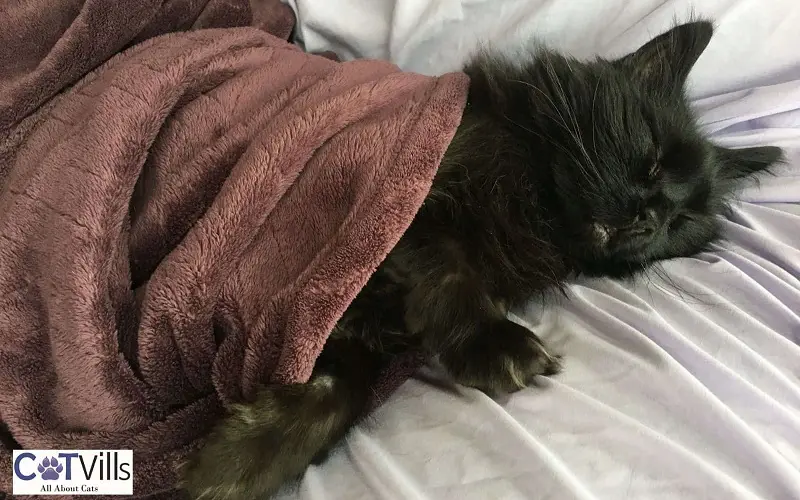
One step down from sleeping on you, sleeping on your bed means your cat will still be close enough to enjoy the positive bonding experience.
But you’ll be a whole lot more comfortable and stand a much better chance of getting a good night’s sleep.
How do you do it?
Set aside some space on your bed just for your cat. You can make it more appealing by putting down a warm blanket or, even better, an old sweater that smells of you.
Give Your Cat a Bed of Her Own
The next degree of separation is to give your cat her own bed in your room.
A cozy cat bed will ensure your cat is still comfortable and not a million miles away from you. Again, placing something in the bed that holds familiar scents will help her settle.
You can even get her a bed with a heating feature if your room gets cold at night to make sure she has a warm spot to sleep in.
You get your bed back and reduce the chances of being woken by your cat moving in the night.
Create a Safe Space Outside of Your Room
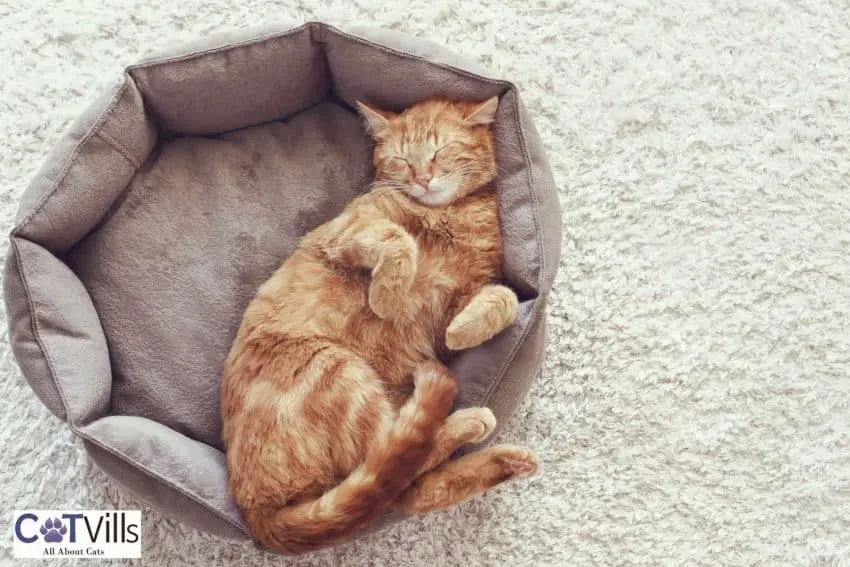
If your cat isn’t getting along with any of the more subtle options, it may be time to look at encouraging her to sleep in a different room.
Cats need several things to fall into place in order for them to feel secure. A nice, warm room with a bed or some other snug place to curl up and hide is ideal.
If you spend some time there with your cat, it will further help her form a positive relationship with the space.
And if all else fails?
Shut The Door To Your Room
If you’re at your wit’s end and need a good night’s sleep to think straight, you may have to resort to shutting your cat out of your room.
It can tug on your heartstrings if your cat sits on the other side, mewing or scratching at the door, but change isn’t always easy.
Changing your cat’s behavior will take time. But by changing your cat’s environment and modifying how you act, you will get there in the end.
Final Thoughts
To summarize this article, your cat sleeps on you because she sees you as warm, safe, and comfortable. She wants to bond with you, mark you out as belonging to her, and show you some love.
The cats sleeping with their owners can be a soothing, positive bonding experience for you both. On the flip side, it could lead to you losing sleep or suffering from allergies.
Your sleeping arrangements are a matter of personal preference. I’m sure your cat will love you no matter what.
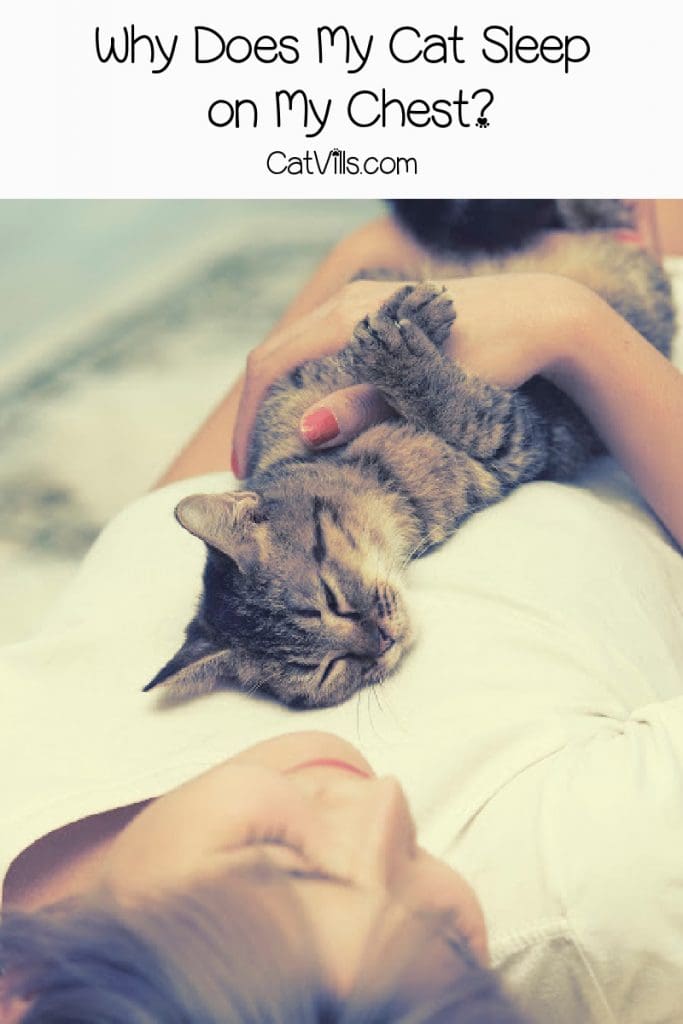

Barry Stingmore is a British content creator living in Fuerteventura, Spain. An animal lover at heart, he shares his home with a dog and four rescue cats. Barry works with the island’s animal charities to help manage and care for feral and abandoned animals. Alongside fieldwork, he works to support the charities with fundraising and raising awareness.
